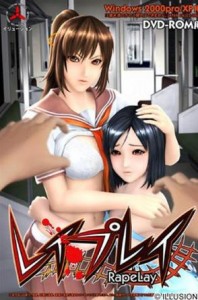You thought Grand Theft Auto was bad. You ain’t seen nothin’ yet!
While The Guinness World Records 2009 Gamer's Edition dubbed Grand Theft Auto as the most controversial videogame series ever with over 4,000 articles published about it, including accusations of glamorizing violence, deliberate sexual indulgence, and connections to real life crimes, GTA won’t have a prayer of keeping its spot when the masses catch wind of a new game entitled: Rapelay.

RapeLay plays like a standard hentai adventure - a series of still pictures
with text – until the characters arrive at the section where he begins seducing
the girls.
Players are encouraged to use varying kinds of violence toward the women in the game: stalking them first, gang-raping them, and eventually forcing the virtual woman they rape to have an abortion.
One website review describes “tears glistening in the young girl’s eyes” as she is attacked in graphic detail.
If the player doesn’t succeed in convincing her to have the abortion, she gets more and more visibly pregnant each time they have sex. And, if in the end she is allowed to give birth, the woman throws the player's character under a train, according to reviews of the game.
The game was intended for release just in Japan, but has been on offer to British buyers through Amazon Marketplace, the section of the online store's website open to third-party sellers.
This February, Amazon withdrew the game after complaints from users, deeming it to be inappropriate.
"We determined that we did not want to be selling this particular item," an Amazon spokeswoman told The Belfast Telegraph.
Rapelay was developed by the Japanese production house Illusion as sort of an off-shoot of their series Interactive Play.
"It baffles me that a game that encourages the raping of a woman can be entertaining and even end up being sold," said Diana Mao, co-founder of Nomi Network, anti-sex slavery organization fighting a million dollar industry in Cambodia. "All of society has become desensitized to the sexual violence against women that is continually broadcast on the radio, movies, and now video games."

Illusion makes a number of sexually violent games for the domestic market including "Battle Raper" and "Artificial Girl."
Russian game developer, nicknamed JazzOleg on MobyGames.com, negatively critiqued the game in 2007, saying that “hearing the screams [of an innocent girl] is not his idea of entertainment.”
“Personally, I was rather disgusted by this game. I don't want to force women to have sex with me, not even digitally (in real life, I don't really have to force anyone, being married and all). But even if you are okay with the whole rape concept, you can't ignore the fact that "RapeLay" has particularly dumb gameplay and no inner logic, no coherence in its events. I'm a big fan of Illusion, they are talented and creative developers, but this product is a failure no matter how you look at it,” he said.
A spokesman for the company defended Illusion’s position: "We believe there is no problem with the software, which has cleared the domestic ratings of an ethics watchdog body."
Francisco Gonzalez, Miami-based game designer of Grundislav Games, claimed that with games like this on the market, parents must be a great deal more vigilant with their children.
“Parents should never let a child anywhere near games like these because kids have not yet distinguished reality from fantasy,” he said. “My boss’s son plays GTA and he’s only 9.”

And this January, a six-year-old boy in Virginia, who claimed he had learned to drive from the game, took his family's car on a 10 mile trip before he crashed.
If this kind of havoc can be wreaked due to the inspiration of games like these, life is certainly imitating the young art of video gaming.

